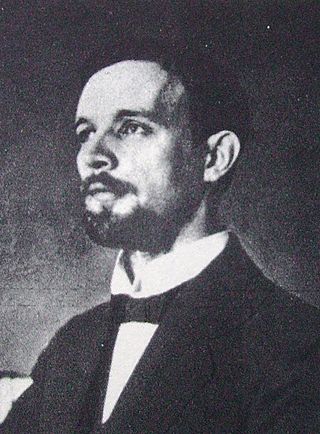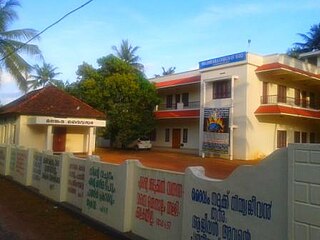Pentecostalism or classical Pentecostalism is a Protestant Charismatic Christian movement that emphasizes direct personal experience of God through baptism with the Holy Spirit. The term Pentecostal is derived from Pentecost, an event that commemorates the descent of the Holy Spirit upon the Apostles and other followers of Jesus Christ while they were in Jerusalem celebrating the Feast of Weeks, as described in the Acts of the Apostles.
The Azusa Street Revival was a historic series of revival meetings that took place in Los Angeles, California. It was led by William J. Seymour, an African-American preacher. The revival began on April 9, 1906, and continued until roughly 1915. On the night of April 9, 1906, Seymour and seven men were waiting on God on Bonnie Brae Street, "when suddenly, as though hit by a bolt of lightning, they were knocked from their chairs to the floor," and the other seven men began to speak in tongues and shout out loud praising God. The news quickly spread; the city was stirred; crowds gathered; services were moved outside to accommodate the crowds who came from all around; people fell down as they approached, and attributed it to God; people were baptized in the Holy Spirit and the sick were said to be healed. The testimony of those who attended the Azusa Street Revival was "I am saved, sanctified, and filled with the Holy Ghost" in reference to the three works of grace of Holiness Pentecostals, the original branch of Pentecostalism. To further accommodate the crowds, an old dilapidated, two-story frame building at 312 Azusa Street in the industrial section of the city was secured. This building, originally built for an African Methodist Episcopal (AME) church, had more recently been used as a livery stable, storage building and tenement house. In this humble Azusa Street mission, a continuous three-year revival occurred and became known around the world. Stanley H. Frodsham, in his book, With Signs Following, quotes an eye-witness description of the scene: The revival was characterized by spiritual experiences accompanied with testimonies of physical healing miracles, worship services, and speaking in tongues. The participants were criticized by some secular media and Christian theologians for behaviors considered to be outrageous and unorthodox, especially at the time. Today, the revival is considered by historians to be the primary catalyst for the spread of Pentecostalism in the 20th century.

The Assemblies of God (AG), officially the World Assemblies of God Fellowship, is an international Pentecostal denomination.

The predominant religion in Brazil is Christianity, with Catholicism being its largest denomination. In 1891, when the first Brazilian Republican Constitution was set forth, Brazil ceased to have an official religion and has remained secular ever since, though the Catholic Church remained politically influential into the 1970s. The Constitution of Brazil guarantees freedom of religion and strongly prohibits the establishment of any religion by banning government support or hindrance of religion at all levels.
The Brazil for Christ Pentecostal Church is an Pentecostal denomination founded in Brazil in the 1950s.

The Pentecostal Assemblies of the World, Inc. (P.A.W.) is one of the world's largest Oneness Pentecostal denominations, and is headquartered in Indianapolis, Indiana. While it began in 1906 with Trinitarian beliefs, it was re-organized in 1916 as Oneness Pentecostal, thus making it the oldest organization of this type.
Bishop Charles Harrison Mason Sr. was an American Holiness–Pentecostal pastor and minister. He was the founder and first Senior Bishop of the Church of God in Christ, based in Memphis, Tennessee. It developed into what is today the largest Holiness Pentecostal church denomination and one of the largest predominantly African-American Christian denominations in the United States.

The Anglican Episcopal Church of Brazil is the 19th province of the Anglican Communion, covering the country of Brazil. It is composed of nine dioceses and one missionary district, each headed by a bishop, among whom one is elected as the Primate of Brazil. The current Primate is Marinez Rosa dos Santos Bassotto. IEAB is the oldest non-Roman Catholic church in Brazil, originating from the Treaty of Commerce and Navigation signed in 1810 between Portugal and the United Kingdom which allowed the Church of England to establish chapels in the former Portuguese colony. In 1890 American missionaries from the Episcopal Church established themselves in the country aiming to create a national church; unlike the English chapels, they celebrated services in Portuguese and converted Brazilians. The Anglican community of Brazil was a missionary district of the Episcopal Church until 1965, when it gained its ecclesiastical independence and became a separate province of the Anglican Communion. Twenty years later, IEAB began to ordain women. It preaches a social gospel, being known for its commitment to fight against problems that affect vast portions of the Brazilian society, such as social inequality, land concentration, domestic violence, racism, homophobia and xenophobia. Its stance as an Inclusive Church has caused both schisms and the arrival of former Roman Catholics and Evangelicals in search of acceptance.

The Assembleias de Deus are a group of Pentecostal denominations in Brazil founded by Daniel Berg and Gunnar Vingren, who came to Brazil as missionaries from the Swedish Pentecostal movement. The Assembleias de Deus are related to the worldwide Pentecostal movement, and some groups are affiliated with the Assemblies of God. Currently, the organization is one of the largest Protestant denominations worldwide.

The Apostolic Faith Mission of South Africa (AFM) is a classical Pentecostal Christian denomination in South Africa. With 1.2 million adherents, it is South Africa's largest Pentecostal church and the fifth largest religious grouping in South Africa representing 7.6 percent of the population. Dr. Isak Burger has led the AFM as president since 1996 when the white and black branches of the church were united. It is a member of the Apostolic Faith Mission International, a fellowship of 23 AFM national churches. It is also a member of the South African Council of Churches.

Lewi Pethrus (born Pethrus Lewi Johansson) was a Swedish Pentecostal minister who played a decisive role in the formation and development of the Pentecostal movement in his country. In 1964, he founded the political party the Christian Democrats.

Protestantism in Brazil began in the 19th century, and grew in the 20th century. The 2010 Census reported that 22.2% of the Brazilian population is Protestant, while in 2020 the percentage was estimated to have risen to 31% of the population, meaning over 65 million individuals, making it the second largest Protestant population in the Western world.
William Howard Durham was an early Pentecostal preacher and theologian, best known for advocating the Finished Work doctrine.

Malankara Church of God Thrikkannamangal is a church in Kottarakkara, Kerala, India, originally known as Malankara Poorna Suvisesha Sabha.
Daniel Berg was a Swedish Pentecostal evangelist missionary who served in the early twentieth century in the Amazon and Northeast Brazil. Together with Gunnar Vingren, he started the movement that gave rise to the name Assemblies of God in Brazil with 22.5 million members in the country, the largest evangelical church in the country.

The Swedish Pentecostal Movement is a Pentecostal movement in Sweden. Many, but not all, of these, are members of the Pentecostal Alliance of Independent Churches, which was founded in 2001. The Pentecostal movement spread to Sweden by 1907 from the 1904–1905 Welsh Revival and the Azusa Street Revival in Los Angeles in 1906.
Alfred Gaelton Garr was an early leader in the Pentecostal movement. Hundreds of churches were born out of his ministry, and he was a pioneer in the healing ministry of Pentecostalism as a whole, leading hundreds of healings during his lifetime. He became a leader in the Burning Bush movement before attending the Azusa Street Revival and subsequently devoting the rest of his life to healing evangelism and planting Pentecostal churches in the nation and across the globe.
Pentecostalism is the fastest-growing Christian denomination in Brazil. Pentecostalism has surged since the 1990s while the largest denomination, Roman Catholicism, has undergone in a decline. At some points, churches were appearing as rapidly as one church per day. Pentecostalism in Brazil traces its roots to the Azusa Street Revival in 1906 in Los Angeles and, like Pentecostal movements in other countries, emphasizes a second act of grace following conversion that results in gifts of the Spirit such as glossolalia and healing.
Pentecostalism began spreading in South Africa after William J. Seymour, of the Azusa Street mission, sent missionaries to convert and organize missions. By the 1990s, approximately 10% of the population of South Africa was Pentecostal. The largest denominations were the Apostolic Faith Mission, Assemblies of God, and the Full Gospel Church of God. Another 30% of the population was made up of mostly black Zionist and Apostolic churches, which comprise a majority of South Africa's African Instituted Churches(AICs). In a 2006 survey, 1 in 10 urban South Africans said they were Pentecostal, and 2 in 10 said they were charismatic. In total, renewalists comprised one-fourth of the South African urban population. A third of all protestants surveyed said that they were Pentecostal or charismatic, and one-third of all South African AIC members said they were charismatic.

The General Convention of the Assemblies of God in Brazil is a Pentecostal Christian denomination in Brazil. It is affiliated with the Assemblies of God, specifically the Assembleias de Deus in Brazil. Its headquarters are in Rio de Janeiro.











